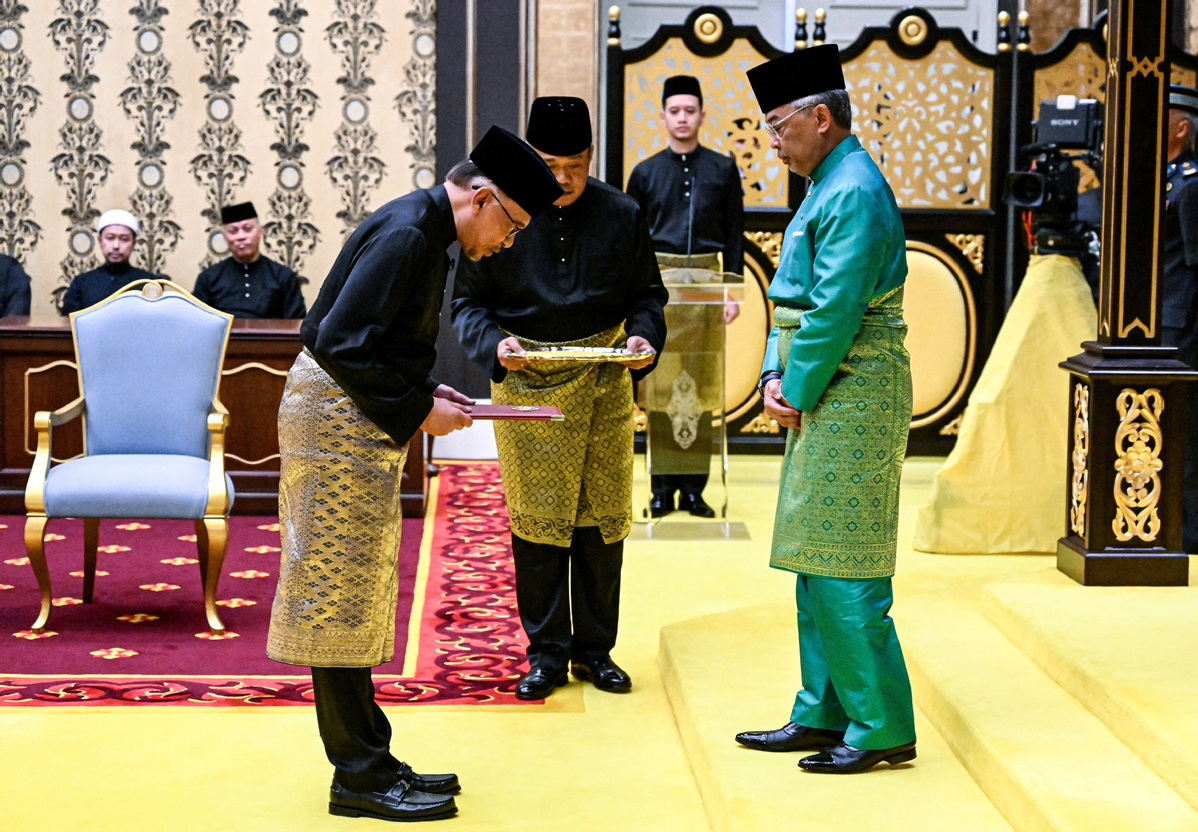Unity govt hopes rest on Anwar
By PRIME SARMIENTO | China Daily | Updated: 2022-11-25 07:42

Appointment of political veteran as PM seen as helping to restore Malaysia stability
Longtime Malaysian opposition leader Anwar Ibrahim was appointed as prime minister on Thursday, setting the stage for a "unity government" that could help restore stability to a nation beset by fractious politics over recent years.
Malaysia's King Sultan Abdullah Sultan Ahmad Shah consented to appoint Anwar after consultation with the country's Conference of Rulers. The monarch had to step in after general elections on Saturday ended in a hung parliament, with political parties failing to form the alliances needed to build the next government.
Anwar took his oath of office at the National Palace in Kuala Lumpur.
Anwar, 75, has been described as Malaysia's longest prime minister-in-waiting. He was deputy prime minister in the 1990s and the official prime minister-in-waiting in 2018. Anwar leads the Pakatan Harapan, or PH, coalition, which captured 82 seats in the weekend elections. While PH emerged as the largest bloc in the parliament, it did not get the minimum number of 112 seats to form a government.
Oh Ei Sun, senior fellow with the Singapore Institute of International Affairs, said that while PH did not win a majority, it still managed to secure a plurality of seats in the parliament. But Oh said that Anwar's appointment is just the beginning of the long work ahead.
"A lot will depend on what sort of unity government that (Anwar) will build," he said. Oh cited the coalition's reform agenda and how the final composition of the next government would affect its enforcement.
The agenda includes the need to reduce the cost of living, fight corruption, promote economic recovery and protect the environment.
'Raising confidence'
"Having Anwar Ibrahim as the prime minister augurs well for the economy and works to raise investor confidence," said Sivananthi Thanenthiran, executive director of the Asian-Pacific Resource and Research Centre for Women, in Kuala Lumpur. She said that a commitment to a reform agenda is important for Malaysia to get back on track after suffering from the impact of the pandemic.
Sultan Abdullah on Tuesday summoned Anwar and Muhyiddin Yassin, a former prime minister and leader of the Perikatan Nasional, or PN, coalition. They were the leading candidates for prime minister as their respective coalition parties secured the most seats in the weekend elections, with PN winning 73 seats. Muhyiddin turned down the king's proposal for PN and PH to form a unity government.
The monarch on Wednesday granted an audience to the leaders of Barisan Nasional, or BN, the longest-ruling political coalition, and Gabungan Parti Sarawak. The United Malays National Organization, or UMNO, the dominant party in the BN coalition, issued a statement in which it said that it was willing to take part in a unity government "not led by Perikatan Nasional".UMNO and PN had a brief alliance in 2020 but this partnership fell apart in less than two years following infighting that forced Muhyiddin to resign as prime minister.
Anwar's appointment means "many people in the urban areas will be happy", said James Chin, professor of Asian Studies at the University of Tasmania in Australia. Chin was alluding to PH's bailiwick. But he noted that the survival of a PH-led government would depend on the actual composition of the coalition government.
Analysts said that it was the political bickering in the past that made it difficult for parties in this year's elections to agree to a coalition government. But Azmil Tayeb, senior lecturer at the School of Social Sciences at Universiti Sains Malaysia, believes that Anwar's appointment as prime minister will push other parties to coalesce around PH to form "a stable majority coalition".
"After all, it's more beneficial for other parties to be part of the government than outside of it," Azmil said.
One of the major criticisms leveled against PH is that it is a multi-ethnic coalition that does not appeal to the Malays — Malaysia's ethnic majority. But Azmil said PH commands around 10 percent of Malay votes and that having BN in the unity government "might help PH's image in the eyes of many conservative Malays".
























